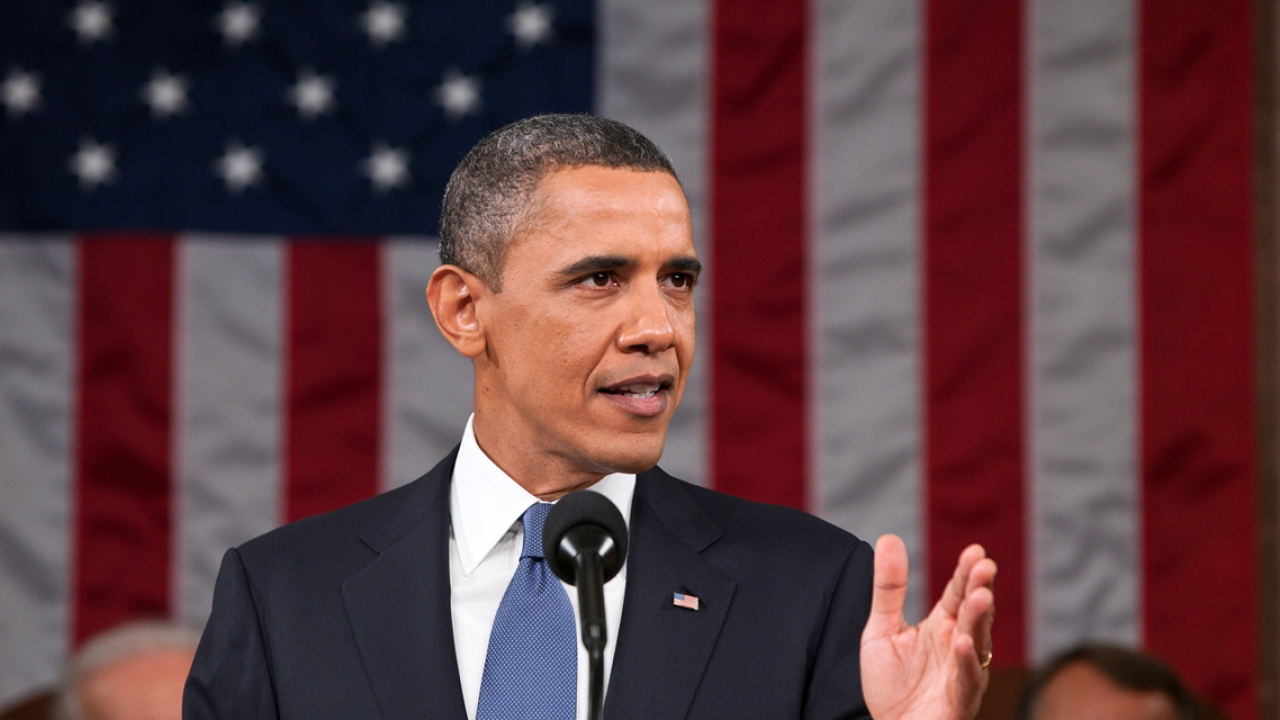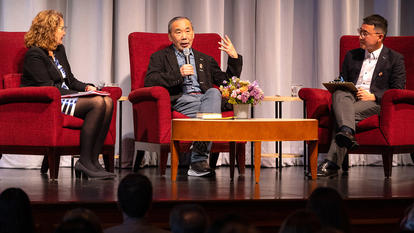Faculty Q&A: Barack Obama’s Presidency and His Legacy

On January 20, one of the hallmarks of American democracy will take place when the nation witnesses the peaceful transfer of power from the Obama administration to the incoming Trump administration. Michael Jeffries, associate professor of American studies at Wellesley, has written extensively about President Barack Obama, including an exploration of race relations during the Obama presidency in his 2013 book, Paint the White House Black: Barack Obama and the Meaning of Race in America.
In an interview, Jeffries assessed Obama’s time as president and whether his 2008 campaign rallying cry of “yes we can” resulted in “yes we did” during his eight years in the White House.
Q: What will be President Obama’s legacy?
Jeffries: President Obama’s most enduring legacy may be the charismatic yet humble persona he built, and the grace and dignity with which his family lived their eight years in the White House. He received more death threats than any other president in history, and the Obamas were subjected to all manner of racist and sexist stereotypes and insults. They had every reason to lash out at their detractors, yet they always carried themselves with remarkable poise. In addition, the Obamas completed their full term in Washington without even a hint of a scandal in their personal or professional lives. Barack’s marriage to Michelle became a model for romantic partnership and parenting for several generations of Americans, and they offered a version of unashamed and public Black love that is rarely seen in American popular culture.
Q: What were some of the Obama administration’s significant accomplishments? Were there any missed opportunities?
Jeffries: The first three policy accomplishments that come to mind are the stimulus package that stemmed the 2008 recession, the capture and killing of Osama bin Laden, and the Affordable Care Act, which resulted in over 20 million more Americans enrolling in health insurance programs. President Obama appointed a larger percentage of women and people of color to the federal judiciary than any president in history, and the Obama administration also stopped enforcing the Defense of Marriage Act, effectively legalizing gay marriage across the United States.
He faced truly unprecedented obstruction from the Republican Congress, as the GOP stated that its goal was to make sure Obama’s presidency was a failure from the moment he was elected. This opposition makes it difficult to blame solely him for falling short on his policy goals. However, there are several areas where it is hard to argue that America is better positioned than it was eight years ago. The distribution of wealth in the United States has not changed for the better, and the relative wealth gap between whites and people of color, especially Blacks and Latinos, persists unabated. The Obama administration deported more immigrants than any administration in history, and the only real sign of immigration reform was the extension of the Deferred Action for Childhood Arrivals program. The United States remains heavily implicated in the political instability and violence in the Middle East, and President Obama dramatically expanded drone warfare during his time in office.
Q: The issue of race loomed throughout his presidency, from the birther movement, to the killings of Trayvon Martin and Michael Brown, to the mass shooting of nine Black parishioners in a South Carolina church in 2015. What is the state of race relations now?
Jeffries: We would be crazy to ignore the symbolic value of having a Black man in the White House, which gave birth to a new sense of possibility for all kinds of historically marginalized groups. Additionally, we must not discount the ways President Obama personalized Black suffering in the wake of tragedies like the Trayvon Martin killing and the Charleston massacre. He showed that even the most privileged among us are traumatized by these attacks, and that the fear and grief that Black people carry on a daily basis is a grave injustice.
But one of the surest signs that racism remains an urgent problem is that many Americans, including President Obama, continue to use words like “race” and “race relations” instead of the word “racism” to describe the suffering and injustice people of color endure. His tendency to discuss racial discord in psychological terms is an insufficient tactic for achieving racial justice, because racism is not just psychological, it is institutional. For example, stereotyping and bias certainly impacted the heinous patterns of police brutality we have witnessed the past eight years. But bias training and trust building between police and the citizenry does little to impact the structural and legal problems with the criminal justice system. We need institutional changes, including the demilitarization of police, new laws governing police use of deadly force, and the end of policing for profit in places like Ferguson, to adequately address racism in this arena.
The president has also shown a tendency to publicly criticize Black people for their supposed cultural shortcomings, which reinforces racist and false stereotypes of Black cultural pathology. He has repeatedly equated misplaced white racial resentment with the legitimate complaints of people of color who suffer from race-based violence, stereotyping, segregation, and discrimination. So in addition to legislative shortcomings, I think President Obama left much to be desired when it comes to understanding and explaining racism.
Q: Barack Obama was the first social media president. He tweeted. He embraced digital media as a way to connect with Americans. What impact did he have on culture?
Jeffries: President Obama became a pop-culture icon, and he leveraged the internet and social media in ways no politician ever had before. His initial campaign in 2008 was heavily reliant on the innovations of mybarackobama.com, which became an online community and training platform for his volunteer army. Obama’s willingness to engage the public on social media demonstrates his popular culture literacy and contributes to the sense that he is in touch with the world his voters live in, rather than stuck in the bubble of Washington, D.C. It is safe to say that he set a new standard in that the American public now expects their president to engage on these platforms, though obviously, the way politicians use these tools is not always a boon for democracy.
Q: He went from Dreams from My Father to “yes, we can” to president of the United States. What do you think the next iteration of Barack Obama will be?
Jeffries: This is the million-dollar question. President Obama has repeatedly told us that he is not the change his voters seek; rather, the citizenry must turn to itself to shape the future. He has also indicated that he is eager to return to the role of citizen, because he believes he can champion democracy, and perhaps ideology, in ways that he was unable to while serving as president. He hinted that he sees the recent erosion of voting rights as perhaps the most urgent issue for our tenuous democracy, so perhaps that is where he will direct his efforts in the immediate future. No matter what issues he focuses on, the next iteration of Barack Obama will be no less important than President Barack Obama. Our democracy and civil rights are clearly under threat, and none of us, including a former president, can afford to sit on the sidelines.
Editor’s note: You can follow Jeffries on Twitter at @M_P_Jeffries.



